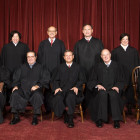
High Court’s Decision in Miller v. Alabama is a Victory for Many, Especially in Communities of Color
|
The W. Haywood Burns Institute (BI) would like to congratulate our colleague Bryan Stevenson at the Equal Justice Initiative and the legions of lawyers, advocates and families on their victory in the U.S. Supreme Court’s decision in Miller v. Alabama.
This decision will impact more than 2,000 young people of which 75 percent are youth of color. The decision specifically holds that young people convicted of homicide cannot mandatorily be sentenced to life without possibility of parole. While some headlines scream that “murderers” will go free, for those of us that live and work in communities of color, this decision is impactful and important. In some communities of concentrated poverty across the country, the line between perpetrator and victim is easily traversed. Families of victims and convicted perpetrators are coming to grips with the facts of the new decision.







